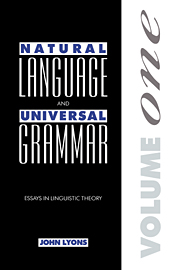Book contents
- Frontmatter
- Contents
- Preface
- Typographical conventions
- 1 Language, speech and writing
- 2 In defence of (so-called) autonomous linguistics
- 3 Linguistic theory and theoretical linguistics
- 4 Natural, non-natural and unnatural languages: English, Urdu and other abstractions
- 5 The origin of language, speech and languages
- 6 Phonemic and non-phonemic phonology: some typological reflections
- 7 Towards a ‘notional’ theory of the ‘parts of speech’
- 8 Deixis as the source of reference
- 9 Deixis and anaphora
- Appendix: The scientific study of language. Inaugural Lecture, Edinburgh, 1965
- Notes
- References
- Subject index
- Names index
6 - Phonemic and non-phonemic phonology: some typological reflections
Published online by Cambridge University Press: 05 June 2012
- Frontmatter
- Contents
- Preface
- Typographical conventions
- 1 Language, speech and writing
- 2 In defence of (so-called) autonomous linguistics
- 3 Linguistic theory and theoretical linguistics
- 4 Natural, non-natural and unnatural languages: English, Urdu and other abstractions
- 5 The origin of language, speech and languages
- 6 Phonemic and non-phonemic phonology: some typological reflections
- 7 Towards a ‘notional’ theory of the ‘parts of speech’
- 8 Deixis as the source of reference
- 9 Deixis and anaphora
- Appendix: The scientific study of language. Inaugural Lecture, Edinburgh, 1965
- Notes
- References
- Subject index
- Names index
Summary
American linguistics has proudly and more or less consciously adopted the pragmatic position; the philosophy of justification by results, of first getting things done and only then, if at all, asking what in fact has been done. In the preface to his collection of articles by American linguists, Martin Joos brings out this point well. He goes on to remark: ‘Altogether there is ample reason why both Americans and (for example) Europeans are likely on each side to consider the other side both irresponsible and arrogant. We may request the Europeans to try to regard the American style as a tradition comme une autre; but the Americans can't be expected to reciprocate: they are having too much fun to be bothered, and few of them are aware that either side has a tradition’ (Joos, 1957: vii). As a representative of one European tradition in the enviable position of having secured a captive American audience for an hour or so, I propose to put before you views that absorption in the fun might otherwise prevent you from considering. To those of you who, having heard these views, might feel inclined to say that they are ‘of only theoretical interest’ and that the linguist's job is to describe what actually occurs in particular languages without troubling himself about what might occur (for I have heard this said), I would suggest that the history of science is full of examples to support the opinion that the actual cannot be properly described, perhaps not even recognized, except in the framework of what has previously been envisaged as possible.
- Type
- Chapter
- Information
- Natural Language and Universal GrammarEssays in Linguistic Theory, pp. 96 - 109Publisher: Cambridge University PressPrint publication year: 1991



